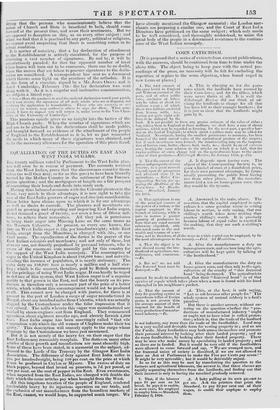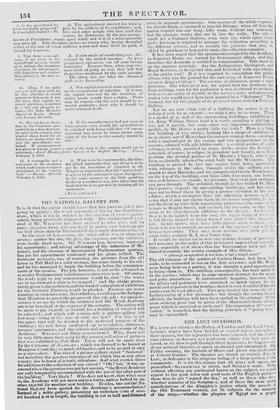CORN CATECHISM.
[It is proposed that a series of extracts from current publications, with the answers, should be continued from time to time under the above title. The object being to keep pace with the actual pro- ceedings of the press, no necessity will be felt for excluding the repetition of replies to the same objection, when found urged in new forms or places.] 1. The total amount of the stuns levied in England and Wales on account of the poor, and of other public rates, exclusive of tithes, may be taken at about ten millions a-year ; of which above two million are levied
from houses,
A. This is charging us for the poor- rates which the landlords have created by their Corn-laws ; and for the tithes, which were never theirs at all. It is well the Edinburgh ReVieW did not think of ad- vising the landlords to charge fur all that has been left to their younger brothers ; for it is just as clear that the landlords might gain by it. leaving not quite eight mil- lions to be defrayed by the laud. It is nut possible to form any precise estimate of the value of tithes ; but, taking them in England at three millions, we shall 'have a sum of eleven millions, which may be regarded as forming, for the most part, a peculiar burs deu on the land of England ; to which about a million more may be added for Scotland. No estimate, having the smallest pretensions to accuracy, has been formed of the total amoral value of the agricultural produce of the empire; but if such an estimate were formed, the countervailing duty On the importa- tion of foreign corn, butter, cheese, beef, seeds, &e., should be an ad ?whams. one; bearing the same relation to the articles on which it is laid, that the twelve millions of extra charge laid on the agriculturists bears to the entire value of their products.—Edinburyle Review, for January 1834, p. 273.
2. That the extent of the power and prosperity uf every country, in a peat measure depends upon the prosperous and advanced state cf its agriculture. — Cor- responding Soviets/ Jrs rp- posing the Abolition of the Corn-laws. 1st Re.sobt- lion. Stawlord, January 29, 1S34.
:3. That agriculture is one of the principal sources of A. It depends upon having Corn. The object of the Corresponding Society is, to grow a bushel of corn at a fraudulent price, for their own personal advantage, by tyran- nically preventing the public from having two from other places. If the manufac- turers laid a tax on home-grown corn, then their would be the tyrants.
A. Answered in the main, above. The assertion that the capital employed in agri- culture h is some peculiar virtue in setting labour in motion, is only saying, that one shilling's worth takes more making than another shilling's worth. It is precisely because labour of equal value is exerted in the making, that they are each a shilling's worth.
the most advantageous to the country.—Ibid. Resolution.
4. That the object is to sow discord among the bro- therhood of agriculture, ma- nufactures, and commerce. —lb. A. Give the manufacturers a duty on home-grown corn, and see how long the agri- culturists will be kept quiet by talking of " the brotherhood."
5. But no ! we are told A. Give the manufacturers the duty on this fraternal bond must be home-grown corn, and then talk to the agri- destroyed.—/b• culturists of the cruelty of " this fraternal bond" being destroyed. The agriculturists cannot be made to understand, that their " fraternal bond " is of that species of copula which takes place when a man is found with his hand entangled in his neighbour's pocket.
G. That the amount of duty for guarding against an immoderate influx of foreign grain, is not greater than the average amount of duty imposed for the benefit of every production of manufac- tured industry.— lb.
A. This, at the best, is only saying, " Let us rob because other people do." The whole system of mutual robbery is a fool's paradise.
But there is another answer, without en- tering on the question whether the "pro- ductions of manufactured industry " ought or ought not to have what is called protec- tion ; which is, that the trade of the landlord is not industry, any more titan the trade of the fundholder. Land may be a very useful and desirable form for vesting property in ; and so are the Funds. Many landholders may both amuse themselves and promote their personal interest by looking after their landed property; and so do many fundholders, by looking after their funded property. There may be men who make money by speculating iu landed property ; and so there are in funded. But it would be very odd if the fundholders were allowed to come forward and say, " We are wronged men, and the fraternal union of society is dissolved, if we are not allowed to have an Act of Parliament to make the Five per Cents pay seven !" It might be very agreeable ; but it would be detestably unjust. In so far as this may be met by transferring the question to the farmers and agricultural labourers, the answer is, that those classes are rapidly separating themselves from the landlords, and finding out that their interest is only in having the mischief gradually removed.
7. That, if the labourer pays 10 per cent on his bread, he pays it to enable, in most eases, his employer to employ him.—Standard, February 3, 1834. A. A baby pulling at its own go-cart to get on. Ask the printers that print the Standard, to pity 10 per cent out of their wages, to enable their employer to employ them. "4. Is the agricultural in- :I. The agricultural interest has tried to seeert too highly pampered ?ain by the robbery of its neighbours; and, Is it too lightly bailed ?—/b. Le most other people who have tiled that
course, its dishonesty, by the just arrange- ments of Providence, rata upon itself, and it is in a most miserable way after all. This therefore makes no reason why, having despoiled whers at the rate of seven millions a-year and done itself no good, it should try fourteen.
9. That these scven mil- lions, if not given to the agricultural interest, would go to inflame the treasuries of princes, fur whose peace. able disposition and conduct their poverty is the best se- curity.
sure you will agree with me in thi., (because it would amount to dishonesty if you did nut), that capital, in- vested anywhere, is entitled to a fair and adequate re- turn.—Sir Jahn Bel-hetes .Npeeelt at Leeds. Stand- ard, January :30, IK34.
11. The cry for an altera- tion in the Corn-laws pro-
to. Then, I am quite A. Not capital invested upon speculation
A. A new mole of conducting war ; dis- covered by the landed interest. As your preparatory operation, cut off your foreign commerce. Because then, when your ene- mies think of going to war, they will find themselves weakened by the sante amount.
The three last are what the Standard puffs as it, Ineincildes.
on the commission of injustice. If it was, the capital invested by the receivers of stolen goods would have a claim. There may be reasons why the evil should be re- moved gradually; none why it should he never removed at all.
A. If the manufacturers had got a tax on home-grown corn, would the agriculturists be satisfied with being told that "if emem- ragement was given to home grown corn, some of the looms in this country would lie idle ? "
le. A cosmopolite and a ccntenmer of the weakness which leads a man to express attachment to his " native laud." — Budan _Herald, February 1, 1634. A. What is to be contemned is, the blun- der which maintains that any thing is to he got by the invention of injustice at all. What is arlintained is, that the " native land" is a beer by the attempt to injure foreigners, in the same manner as the little peddling dealer in a market-teem, who takes into his head that he is to get rich by injuring all his customers.
( he east ht and.)





















 Previous page
Previous page